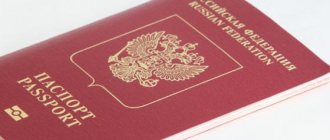The deregistration of an adult and capable citizen who lived in one place of residence and his further registration in another is a common procedure and, as a rule, not accompanied by great difficulties. Another thing is minors. In addition to the general constitutional rights that every citizen of Russia has, the rights of children, including to housing, are specially protected by the state and the laws of the Russian Federation.
Registration is an outdated concept that is still widely used in everyday life . According to current laws, it has been replaced by “permanent registration at the place of residence,” which can be the only one for each Russian citizen or foreign citizen permanently residing in the territory of the Russian Federation for a given time period.
A record of a citizen’s temporary stay for any reason in another place is defined as “temporary registration at the place of stay”
In the life of any family, many situations arise that force decisions to be made that concern not only its adult members, but also minor children. A considerable part of such life situations is associated with a change in place of residence of both the entire family and its individual members. Most often they occur in the following situations:
- a family moving to a new apartment when selling the old one, exchanging or donating it;
- divorce and exchange of living space by former spouses;
- re-registration of a child from the living space of one of the former spouses to another, with whom he will live in the future;
- registration of a child in the living space of grandparents, as well as in a number of other cases.
The main requirement that guides the law in all these cases is that when re-registering the address of a new home, so that after the child is discharged from one place of residence, he is immediately registered in another. The place of permanent registration in the minor’s apartment should not be “hanging.”
And supervisory authorities monitoring compliance with children's rights insist on strict compliance with these requirements
In addition, the living space per child in the new location should not be less than at the old address. And according to other parameters, deterioration of the living conditions of a minor is not allowed during re-registration. In particular, changing private housing to communal housing is not allowed.
Rules for registering a child
The first global rule is introduced by Article 20 of the Civil Code of the Russian Federation and applies to children under 14 years of age. It says that young children can only be registered with at least one parent . Read in detail about how a newborn child is registered in an apartment after birth, and from this article you will find out whether it is possible to register a child separately from his parents and without parents.
The second is the human right to housing, established by Article 40 of the Constitution, while the state especially monitors the observance of children’s rights.
Extract by court decision
Cases when it is possible to discharge a child through the court: he has lost or has not acquired the right to use real estate, or it has been terminated.
Important! Representatives of the guardianship and trusteeship authorities must be present at the court hearing as third parties. If the child is over 10 years old, then his opinion is also taken into account.
It is impossible to conduct a trial in the following cases:
- Children under 14 years of age were registered during the privatization of municipal housing.
- The minor is the owner.
- In the event of a claim being filed by a person who is interested in obtaining the disputed premises.
It is worth understanding that a decision in favor of the plaintiff in such cases is rare. After all, according to the law, the court is obliged to take into account the rights and interests of the child in the first place. A common case is a deregistration from an apartment where the minor does not actually live, and he has a new place of residence. As for the most difficult situations, they are associated with deregistration if children under 14 years of age are planned to be registered in a smaller living space in the future.
How to register a child in another apartment?
The easiest way to discharge a minor child is not to discharge him, but to immediately submit an application for registration at another address .
In this case, the FMS authorities themselves will transmit information about the new registration , and the child will be discharged at the previous address.
Download a sample application for registration at the place of residence.
It is worth remembering, however, that in this case, children under 14 years of age will only be registered with their parents.
What do you need?
To discharge a minor child from an apartment and register him in another, you must prepare papers for the passport office. Does a minor child need registration and how to register him before the age of 14 and after, read here.
The administrative regulations on the provision of state registration services establish the following list of documents for extract:
- Birth certificate;
- Passport (for children over 14 years old);
- Legal representative document;
- A statement in any form about the desire to remove the child from registration.
Download a sample application for deregistration.
This list is exhaustive, that is, the passport service should not require any other certificates or consents. It also does not depend on housing ownership (privatized or municipal apartment).
Who applies for a child's discharge?
For minor children under 14 years of age, the application is submitted by parents (guardians); the presence of the child himself is not required. Children who have reached the age of partial legal capacity ( after 14 years ) submit an application themselves , but with the consent of their legal representatives.
The application must indicate the address where the child is leaving. If there is no such address, for example, when leaving for permanent residence in another country, then you need to describe the reason for the discharge.
About the residential address of the child and parent
During consultations, I am always asked a similar question: “I don’t know where the child and his parents live now. What address should I include in the statement of claim then? And if I know, then indicate their actual address?”
The defendant's residential address is his registered address. This is the position of the Supreme Court, described in paragraph 63 of the Resolution of June 23, 2015 N25. Therefore, in the statement of claim, we indicate the address of residence of the child and parent as the address of the municipal apartment from which they need to be discharged. They are written in it. The plaintiff has no obligation to know their actual address.
As a result, all court summonses will be sent to them at the address of the municipal apartment - Art. 113 Code of Civil Procedure of the Russian Federation. If they do not receive them (they do not live there), the court will still consider them notified. Any citizen is required to receive important correspondence, and parents/guardians do this for children. Therefore, the law is observed here. If they do not appear in court, the claim will be considered without their participation - clause 4 of Art. 167 Code of Civil Procedure of the Russian Federation. This benefits the plaintiffs because the defendants will not be able to protect their interests.
Is it possible to register a child in another city without the father’s consent?
A lot of misunderstandings are caused by the loose interpretation of Article 65 of the Family Code, which states that the place of residence of children when parents live separately is established by their agreement.
Based on this norm, FMS employees require the presence of the second parent or notarized consent, especially if the spouses are registered in different places. However, not a single regulatory document contains any indication of the need to somehow prove the consent of the second parent .
Clause 114 of the Administrative Regulations directly states that for the registration of children under 14 years of age, the consent of one of the legal representatives .
In the event that divorced parents cannot come to a common decision on the registration of children, this issue is resolved in court .
Main legal provisions
Registration of a minor differs from the same operation carried out with adults.
The rights of young children are carefully protected by the state, modern legislation and supervisory authorities!
Guardians and parents of children whose age does not exceed 14 years are required to know all the features of the process of registering minors in another residential area. It is important to write this out and then immediately register the minor so that his rights are not violated.
If you need to carry out such an operation, you should be mentally prepared for the fact that additional documents will be required. They will have to be obtained from special organizations that provide guardianship for minors.
If you study the conditions and requirements for registering children and the procedure presented in the article, you can avoid many mistakes and save time.
Is the consent of the guardianship authorities required to register (discharge) a child?
Despite many rumors about the activities of social security authorities, they do not deal with issues of registering children at their place of residence .
The task of the guardianship authorities is to protect the rights of children , including property (property rights) and constitutional (right to housing).
So, to discharge a child who does not have ownership rights in an apartment (house, room), no documents from guardianship are needed. They will not be required when deregistering a child owner, if the change in registration address is not accompanied by the alienation of his property.
When is consent required?
The consent of the guardianship and trusteeship authorities will be required in the following cases:
- Sale of housing where the child has a share of the property.
Real estate transactions involving children's property are the most difficult to conduct.To obtain guardianship consent, you need documents for both apartments, including BTI floor plans, documents and notarial consents or the personal presence of all owners.
- Exchange of municipal housing.
This operation, which is quite rare in our time, also cannot be done without a guardianship decision. This necessity is caused by the fact that all members of the tenant’s family have an equal right to use housing.The guardianship will need to provide a social rent agreement, BTI documents for both apartments, consent and passports of all residents, as well as confirmation of the possibility of this exchange from government bodies (for example, the housing construction department). Read about how to register a child in a municipal apartment and within what time frame.
- Discharge of children left without parents .
This is the only case when a decision is made on the very fact of deregistration. To do this, the new legal representatives of the child need to contact the USZN with the same set of documents as for registration at the new address, namely: - Birth certificate or passport of the child;
- Documents for housing where the child is expected to be registered;
- Statement.
Please note that in both cases, approval from social protection is required for the very fact of the child’s discharge, but for actions with real estate! To obtain a positive decision, it is important that the child is provided with the same or larger area in the new housing, and that his living conditions do not worsen.
Passport of the legal representative;
The maximum period for making a decision is 15 working days .
Do you know with whom a minor child should be registered if the parents are divorced?
A newborn child must be registered in the apartment no later than 7 days from the date of receipt of the birth certificate. Read about registration details here.
Don't know where to register your child? For instructions on registering a newborn through the MFC and State Services, read the article
Where to contact
To obtain an extract, apply to the MFC at your previous place of residence.
In case of simultaneous registration and deregistration, documents are submitted to institutions only at the new address.
The discharge period may take from 3 to 7 business days , depending on the individual situation. In any case, the specialist notifies you of the exact date of the final discharge.
Completed documents are collected at the same place where you submit them.
Documents can also be submitted through the Internet portal of government services. However, you still need to come to the MFC at the appointed time and submit documents in paper form.
Who is deregistering
Usually, parents decide on the issue of termination of registration simultaneously with themselves and their child . When the baby is not registered with mom/dad. For example, parents moved out earlier due to some circumstances, but their child continued to be listed as living. area. Then the “discharge” issue is dealt with only for the minor.
An outsider can also terminate the registration of a minor. In life, this is a homeowner who wants to get rid of “undesirable tenants.” Contrary to the wishes of the parents, he organizes through the court both the eviction and the discharge of the baby.
Documents for the child's discharge
- Most of the documents needed to discharge a child or agree on a guardianship deal are already in the hands of the parents. These are birth certificates, passports, and a certificate of registration of ownership of an apartment.
- The cadastral plan and explication must be ordered from the BTI through a personal application or through the government services website. The provision of these documents is paid, the readiness period is 10 working days .
- A single housing document or a replacement set (extract from the house register, certificate of absence of debt on utility bills, personal accounts) can be obtained at the district MFC or at the passport office and accounting department of the housing office, usually these are two adjacent windows.
Where to apply to remove a child from an apartment?
- In the district MFC or “My Documents” item
You can discharge your child by contacting the multifunctional center at your place of residence.In this case, you will have to go through several windows to verify documents, obtain an extract from the house register, have a copy certified by the manager, etc.
The service period is 3 working days ; documents must be collected at the same MFC.
- To the passport office
When contacting the passport service directly, if there are no multifunctional centers in the locality, the procedure will be similar.The set of documents that must be provided for discharge does not change either.
- To the government services website
To submit an application electronically, you need to fill out a form on the website and upload scans of all necessary documents. After 3 working days, you will receive an invitation by email to appear at the Federal Migration Service with original documents for verification and making a final decision on the discharge.
How to discharge a registered child from an apartment?
The move of a family to another locality is often accompanied by the sale of housing and being discharged “to nowhere.” Many are afraid of possible questions from guardianship and the passport office, but everything is not as complicated as it seems at first glance.
- If the child was not the owner of the sold home , then it is enough to indicate in the application for discharge the expected address where the family will stay for the first time (with friends, in a boarding house, etc.). There is no need to worry about checks from social security if the family is prosperous and not registered.
- In the case where the child’s property was sold , already at the stage of agreeing on the transaction with guardianship, the parents sign an obligation to purchase new housing, register the child in it and allocate a share to him within three months. This document must be attached to the application for discharge.
It is mandatory to register a child, including a newborn. Our experts have prepared articles from which you will learn how long and where to go to register your child, what the fine is for late registration and how to appeal it, whether it is possible to register a child temporarily and the dangers of registration for the owner, as well as how to get a job in a kindergarten without registration.
Grounds for re-registration
Small children must be registered where their parents or guardians appointed by the guardianship department are registered!
The need to change your registration may arise in the following common situations:
- Sale of an apartment.
- Exchange of living quarters.
- Change in marital status, for example, divorce of father and mother.
The specifics of the re-registration procedure depend on the status of the residential premises, the form of ownership and the fact of the child’s participation in privatization.
Can the owner discharge a registered child?
Often a situation arises when the child has not lived in the apartment for a long time, but it is difficult to obtain the consent of his legal representative for discharge for one reason or another.
To solve this problem, the owner of the apartment must apply to the court with a claim to recognize the citizens registered in the apartment as having lost the right to use (Registration Rules, paragraph 31). First of all, the claim is filed against the parent, and the child is then discharged along with him .
The right to use can be lost when property is transferred to a new owner or if the child does not actually live at this address.
In the life of every family, circumstances may arise that require the child to be removed from the apartment. This procedure should not cause difficulties, but it should be understood that in any controversial situation the law will primarily protect the rights of the child.








